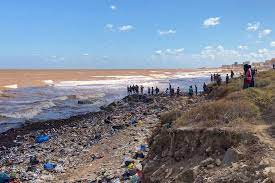TRIPOLI (Agencies): “Have you ever seen a desert become the sea in the blink of an eye?” It is the image that has stayed in 22-year-old Muhammad al-Awkali’s mind from the day Storm Daniel struck his village of al-Mukhaili near Libya’s coastal city of Derna. He recalled the moments his village encountered the devastating floods that hit parts of eastern Libya last week, killing more than 11,000 people.
After a “loud, strong storm with violent winds” passed through the area, there was a sense of false “calm”, al-Awkali told Al Jazeera. “We went to sleep reassured. But then, at around 12:30am, without any warning, water started gushing into the house,” he said. Together with his family members, they made their way to the roof. It was at that moment that he realised the scale and intensity of the floods.
“I was astonished by the horror of what I saw. A massive flood had engulfed the entire area and came from two different directions – from the north and west,” al-Awkali said. Together with his friends, al-Awkali felt a sense of responsibility towards his neighbours and community. He knew others nearby would be badly affected because of their low-lying area that is essentially a valley, he said. Many remained trapped in their homes and could not make it to the roof – seemingly the safest spot to lay in.
“I tried to move around, but the torrent took me along and violently tossed me across our neighbour’s fence,” he said. After several minutes, he ended up climbing his neighbour’s wall with “great difficulty”, and found them on top of the cupboards fighting off the water. “They spent the night on top of the wardrobe, and no one was able to help them,” he said.
For days, people in his village lived on the roofs of their homes and on top of their furniture as water levels were “incredibly high”. No one knew what was happening in the “outside world” after power lines were cut, he said. “Imagine an entire village waking up and going to sleep … without access to food or drink.” Their fate was similar to thousands of others in the coastal region. Derna has been by far the worst-hit city after dams overwhelmed the city, unleashing a torrent of water on it. But the storm also killed people in the towns of Bayda, Susa, Um Razaz and Marj, according to Health Minister Othman Abduljalil.
At least 10,000 people are missing amid search and rescue efforts. Aid has also started to trickle in from the internationally-recognised government in Tripoli and from international donors. Mayor Abdel-Moneim al-Ghaithi has warned that the death toll in Derna alone could climb to 20,000 given the number of neighbourhoods that were washed out. While most of the search and rescue efforts have been concentrated in Derna, others in nearby areas say they have yet to receive assistance.
Faisal al-Darsi, who hails from the village of al-Wardiya, some 20km (12 miles) west of Bayda, said his village has not yet received any help due to collapsed roads and damaged infrastructure. “To this day, we have not received any help from the government or from any official body. Instead, we’re being helped by the people in the neighbouring areas,” al-Darsi told Al Jazeera. He said it has become increasingly difficult to access the village. There is “no electricity, fuel, water, or food”. “The floods wiped out everything here, including supermarkets, entire homes, electricity and phone towers as well,” al-Darsi said.
Out of 50 houses, the floods have taken away at least 20 houses in the village, he added. The storm has exposed vulnerabilities in the oil-rich country that has been mired in conflict since a 2011 uprising that toppled long-ruling dictator Muammar Gaddafi. Experts have said corruption, poor maintenance of public infrastructure, and years of political infighting – with Libya divided between two rival administrations – have made the country particularly vulnerable and ill-equipped to tackle Storm Daniel.
Residents in each of the affected areas are also struggling to find loved ones as entire families remain missing. “We do not know who died and who is still alive,” al-Darsi said, “Entire families were lost in our village, some of them are still buried under the mud, and others were thrown into the sea by the torrent,” he said. Some 27 bodies have been found so far, he added, but “so many more people are still missing”.







